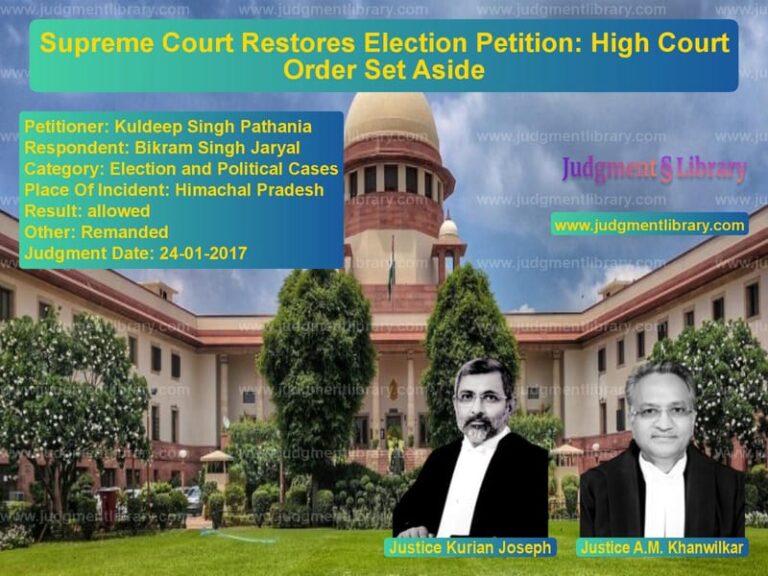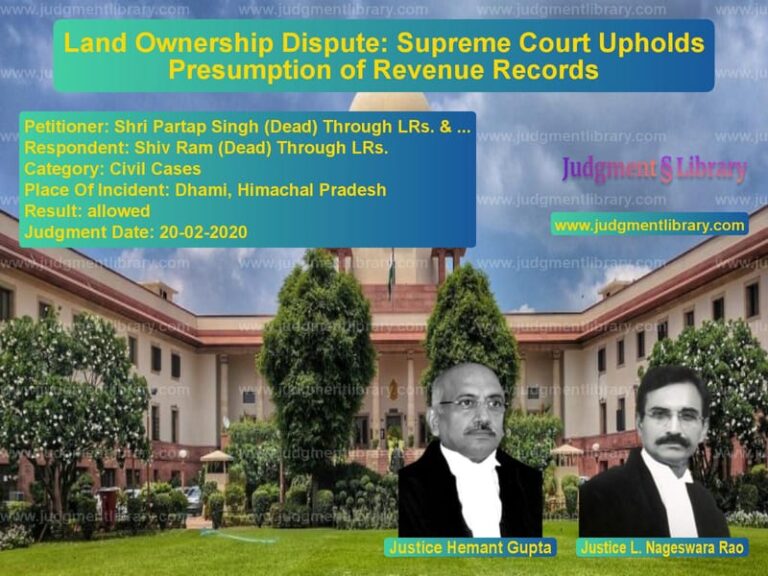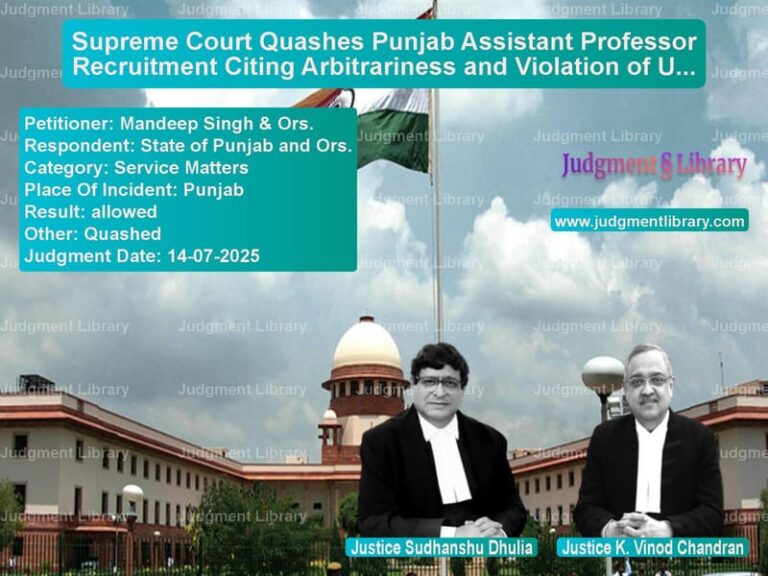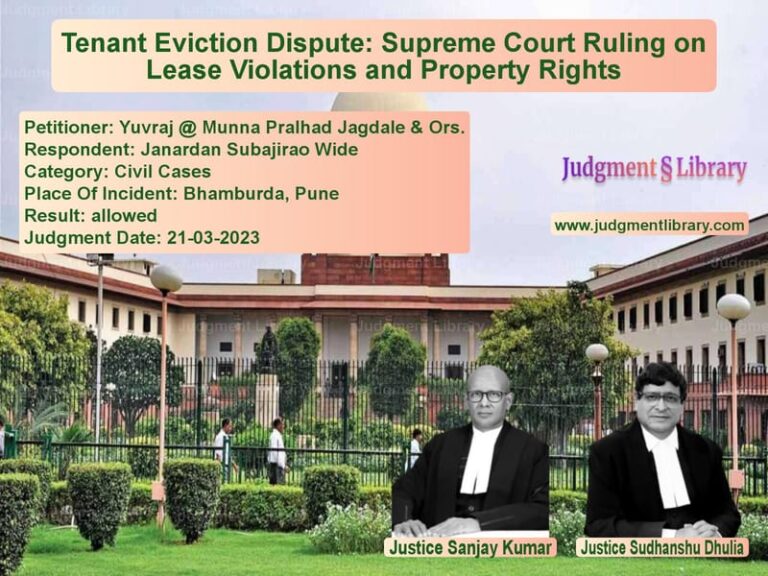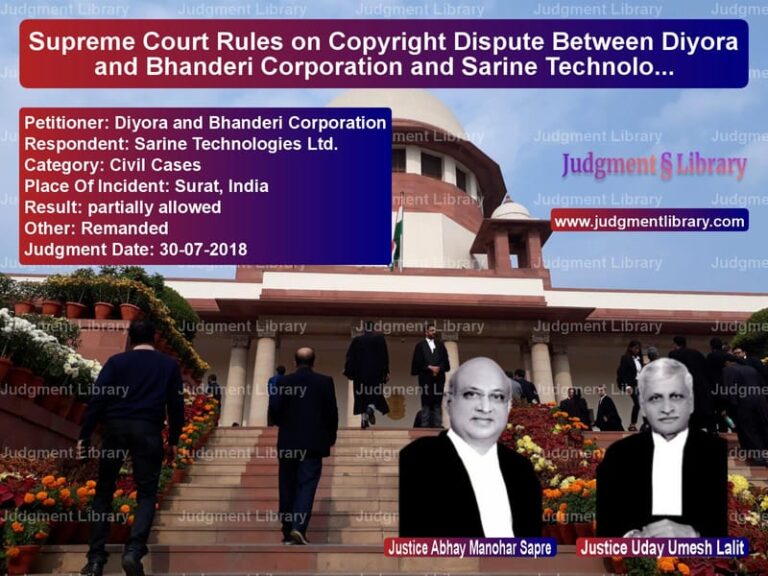Anticipatory Bail Reversed: Supreme Court Rules on Misappropriation Case in Maharashtra
The case of M/s Supreme Bhiwandi Wada Manor Infrastructure Pvt. Ltd. v. The State of Maharashtra & Anr. dealt with allegations of fraudulent misappropriation of funds meant for farmers in Maharashtra. The Supreme Court’s ruling overturned anticipatory bail granted by the Bombay High Court, emphasizing the importance of judicial scrutiny in cases involving serious financial fraud.
Background of the Case
This case involved four appeals arising from a fraud allegation related to infrastructure projects in Maharashtra. The complainant, M/s Supreme Bhiwandi Wada Manor Infrastructure Pvt. Ltd., was awarded a contract for constructing a bypass road from Vishwabharati Phata to Vadapa Junction, covering a stretch of 7.90 km in Thane district.
The accused individuals, who were employees of the company, were responsible for identifying eligible farmers for compensation and distributing payments. The complainant alleged that the accused misappropriated funds by creating fraudulent land records, issuing checks to non-existent landowners, and diverting payments intended for genuine beneficiaries.
Key Allegations
- The accused were entrusted with disbursing land acquisition compensation to affected farmers.
- They allegedly created 66 fake tenant identities and falsified land records.
- Through forged documents, they withdrew Rs. 87,76,755, defrauding the company.
- The accused allegedly collaborated with farmers to create false ownership documents and withdrew Rs. 1.57 crores fraudulently.
- In another instance, they allegedly withdrew Rs. 1.84 crores using fraudulent power of attorney documents.
- The total misappropriated amount, as per the complaint, exceeded Rs. 5.28 crores.
Legal Proceedings Before Lower Courts
Following the complaint, the Metropolitan Magistrate at Andheri, Mumbai, directed the police to investigate under Section 156(3) of the Code of Criminal Procedure (CrPC). Consequently, an FIR (No. 2 of 2016) was registered at the Powai Police Station for various offenses under the Indian Penal Code (IPC), including fraud, forgery, and criminal conspiracy.
Two of the accused, A2 and A3, obtained anticipatory bail from the Sessions Court in February 2017. Subsequently, A1 and A4 approached the Bombay High Court, which granted them anticipatory bail in December 2017. The complainant challenged these orders before the Supreme Court.
High Court’s Reasoning for Granting Bail
The Bombay High Court granted anticipatory bail primarily on the following grounds:
- The complaint was filed under Section 156(3) CrPC without the complainant being examined under oath, as required by Section 200 CrPC.
- The court doubted the validity of the investigation order issued by the Magistrate.
- It opined that the accusations were made “only with the object of injuring or humiliating the applicants by arresting them.”
Arguments Before the Supreme Court
The complainant, represented by counsel, challenged the High Court’s decision, arguing:
- The High Court failed to assess the gravity of the allegations properly.
- The Magistrate had correctly exercised power under Section 156(3) CrPC, which does not require prior examination of the complainant under Section 200.
- The accused had actively obstructed investigations by evading police inquiries.
- The fraud involved large sums of money and directly impacted government land acquisition processes.
The defense, representing the accused, countered that:
- The accused had cooperated with the investigation and should not be denied bail after three years.
- The High Court was correct in its interpretation of Section 200 CrPC.
Supreme Court’s Ruling
The Supreme Court ruled in favor of the complainant and overturned the anticipatory bail granted to the accused. It found serious errors in the High Court’s decision, stating:
“There is a serious error in the view of the Single Judge. First and foremost, the Magistrate’s order under Section 156(3) was not under challenge before the High Court and has attained finality. The High Court was in error in raising a doubt about the correctness of the order under section 156(3).”
The Court emphasized that Section 156(3) empowers a Magistrate to order an investigation before taking cognizance, and Section 200 applies only when the Magistrate takes cognizance of the complaint. It cited previous Supreme Court rulings confirming this interpretation.
Read also: https://judgmentlibrary.com/bail-conditions-and-victim-compensation-supreme-courts-landmark-ruling/
Additionally, the Supreme Court noted that the High Court failed to consider the seriousness of the allegations and the potential impact on public trust in land acquisition processes.
Key Takeaways from the Judgment
- The Magistrate’s power under Section 156(3) to direct an investigation is independent of the requirements under Section 200 CrPC.
- The High Court’s interpretation of anticipatory bail provisions was flawed as it ignored the gravity of the fraud allegations.
- Fraudulent misappropriation of land acquisition funds is a serious offense affecting not just the complainant but also public trust in infrastructure projects.
- Courts must scrutinize financial fraud cases rigorously before granting pre-trial bail.
Conclusion
The Supreme Court’s ruling reinstates a crucial principle—serious allegations of financial fraud must not be taken lightly. By overturning anticipatory bail granted by the High Court, the Court reaffirmed that judicial discretion must be exercised with due regard for the interests of justice and the rule of law.
As a result, the accused individuals now face regular investigation and potential prosecution for their alleged misdeeds. This case serves as an important precedent for handling financial fraud and misappropriation cases in India’s legal system.
Petitioner Name: M/s Supreme Bhiwandi Wada Manor Infrastructure Pvt. Ltd..Respondent Name: The State of Maharashtra & Anr..Judgment By: Justice Dhananjaya Y Chandrachud, Justice M R Shah.Place Of Incident: Maharashtra.Judgment Date: 26-07-2021.
Don’t miss out on the full details! Download the complete judgment in PDF format below and gain valuable insights instantly!
Download Judgment: ms-supreme-bhiwandi-vs-the-state-of-maharas-supreme-court-of-india-judgment-dated-26-07-2021.pdf
Directly Download Judgment: Directly download this Judgment
See all petitions in Fraud and Forgery
See all petitions in Money Laundering Cases
See all petitions in Bail and Anticipatory Bail
See all petitions in Judgment by Dhananjaya Y Chandrachud
See all petitions in Judgment by Mukeshkumar Rasikbhai Shah
See all petitions in allowed
See all petitions in supreme court of India judgments July 2021
See all petitions in 2021 judgments
See all posts in Criminal Cases Category
See all allowed petitions in Criminal Cases Category
See all Dismissed petitions in Criminal Cases Category
See all partially allowed petitions in Criminal Cases Category


